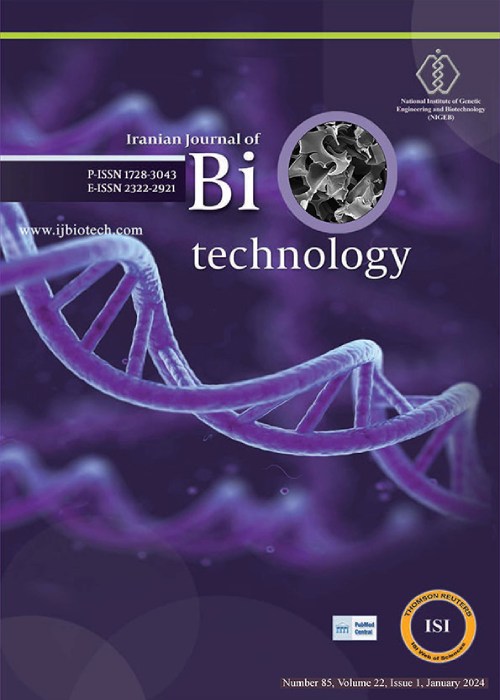Ectopic expression of OCT4B1 Decreases Fertility Rate and Changes Sperm Parameters in Transgenic Mice
Author(s):
Article Type:
Research/Original Article (دارای رتبه معتبر)
Abstract:
Background
The octamer-binding transcription factor-4 (OCT4) is known as an established important regulator of pluripotency, as well as a genetic “master switch” in the self-renewal of embryonic stem and germ cells. OCT4B1, one of the three spliced variants of human OCT4, plays crucial roles in the regulation of pluripotency and stemness.Objectives
The present study developed a transgenic mouse model containing an OCT4B1-expressing construct under the transcriptional direction of mouse mammary tumor virus promoter (pMMTV) to evaluate the role of OCT4B1 in the function of male germ cells in terms of fertility potential. Additionally, the effect of ectopic OCT4B1 overexpression on endogenous OCT4 expression was examined in mouse embryonic stem cells (mESCs).Material and Methods
The pMMTV-OCT4B1cDNA construct was injected into the pronuclei of 0.5-day NMRI embryos. Transgenic mice were identified based on the PCR analysis of tail DNA. Further, Diff-Quik staining was applied to assess sperm morphology, while the other sperm parameters were analyzed through a conventional light microscopic evaluation according to World Health Organization (WHO) criteria. The fertility rate was scored by using in vitro frtilization (IVF) method. Furthermore, mESCs was electroporated with the OCT4B1cDNA-containing constructs, followed by analyzing through employing semi-quantitative RT-PCR and western blotting.Results
The results demonstrated the changes in sperm morphology, as well as a statistically significant decrease in the other sperm parameters (count, viability, and motility) and fertility rate (p<0.05) in the transgenic mice compared with the control group. The assessment of the cause of the embryonic stem cell (ESC) death following transfection revealed a significant reduction in the endogenous OCT4 expression at both mRNA and protein levels in the transfected mESCs compared to the control ones.Conclusion
In general, the in vivo results suggested a potential role of OCT4B1 in the spermatogenesis process. These results represented that the overexpression of OCT4B1 may induce its role in spermatogenesis and fertility rate by interfering endogenous OCT4 expression. However, further studies are required to clarify the mechanisms underlying OCT4B1 function.Keywords:
Language:
English
Published:
Iranian Journal of Biotechnology, Volume:20 Issue: 3, Summer 2022
Pages:
23 to 33
https://magiran.com/p2454021
دانلود و مطالعه متن این مقاله با یکی از روشهای زیر امکان پذیر است:
اشتراک شخصی
با عضویت و پرداخت آنلاین حق اشتراک یکساله به مبلغ 1,390,000ريال میتوانید 70 عنوان مطلب دانلود کنید!
اشتراک سازمانی
به کتابخانه دانشگاه یا محل کار خود پیشنهاد کنید تا اشتراک سازمانی این پایگاه را برای دسترسی نامحدود همه کاربران به متن مطالب تهیه نمایند!
توجه!
- حق عضویت دریافتی صرف حمایت از نشریات عضو و نگهداری، تکمیل و توسعه مگیران میشود.
- پرداخت حق اشتراک و دانلود مقالات اجازه بازنشر آن در سایر رسانههای چاپی و دیجیتال را به کاربر نمیدهد.
In order to view content subscription is required
Personal subscription
Subscribe magiran.com for 70 € euros via PayPal and download 70 articles during a year.
Organization subscription
Please contact us to subscribe your university or library for unlimited access!


